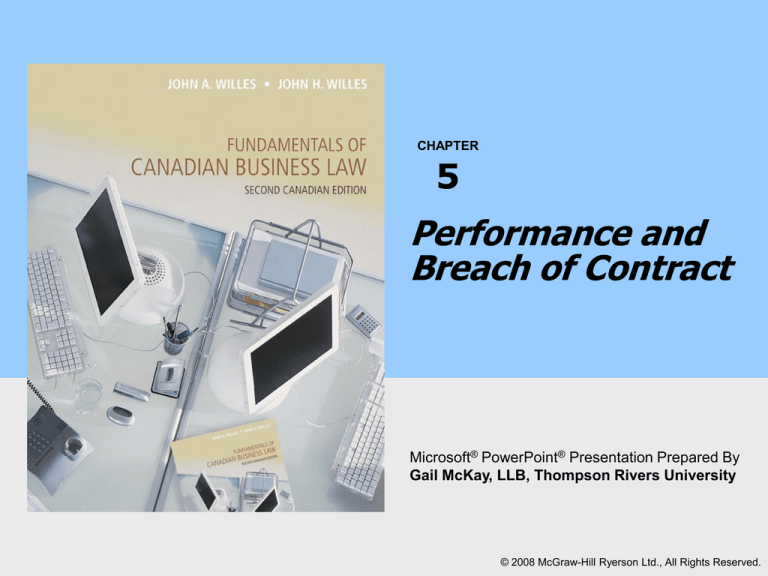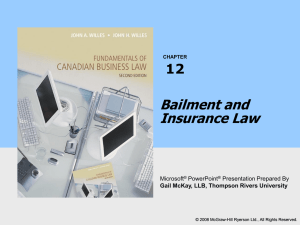
CHAPTER
5
Performance and
Breach of Contract
Microsoft® PowerPoint® Presentation Prepared By
Gail McKay, LLB, Thompson Rivers University
© 2008 McGraw-Hill Ryerson Ltd., All Rights Reserved.
OBJECTIVES
1. To examine the nature and extent of
performance required to discharge a
contract
2. To determine the types of events that
prevent performance of a contract
3. To establish what conduct comprises a
breach of contract
4. To survey remedies for breach of contract
Fundamentals of Canadian Business Law, 2nd Canadian Edition
Slide 1-1
© 2008 McGraw-Hill Ryerson Ltd., All Rights Reserved.
NATURE AND EXTENT OF PERFORMANCE
THE NATURE AND EXTENT OF PERFORMANCE
If we consider how many routine contracts that we
enter into every day of our lives (e.g., buying a cup
of coffee, taking the bus, buying gas for our car,
paying for parking, etc.)
We would note that most, if not all of those
contracts, go as expected and are performed in
accordance with their terms
Fundamentals of Canadian Business Law, 2nd Canadian Edition Slide 1-2
© 2008 McGraw-Hill Ryerson Ltd., All Rights Reserved.
You buy a cup of coffee and you pay for it. You
always pay $1.10 and you always get a cup of
coffee in return
However, there are instances when the
contract does not go according to plan.
One party may not have performed his/her
part of the bargain.
You paid the money, but you did not get your
cup of coffee. The coffee shop is in default of
the contract. There has been a breach of
contract
Fundamentals of Canadian Business Law, 2nd Canadian Edition Slide 1-3
© 2008 McGraw-Hill Ryerson Ltd., All Rights Reserved.
When performance of the contract is completed in
accordance with its terms, the contract is said to
be discharged
The act of offering to perform the promised act in
a contract is called tender of performance and
may take one of two general forms:
1. Tender of payment
2. Tender of performance
Fundamentals of Canadian Business Law, 2nd Canadian Edition Slide 1-4
© 2008 McGraw-Hill Ryerson Ltd., All Rights Reserved.
NATURE AND EXTENT OF PERFORMANCE
Less than complete performance of a
contract is a failure to respect its terms
If performance of the promise is not exact and
precise, the contract may not be discharged
Fundamentals of Canadian Business Law, 2nd Canadian Edition
Slide 1-5
© 2008 McGraw-Hill Ryerson Ltd., All Rights Reserved.
TENDER OF PAYMENT
Tender of payment occurs when the debtor
formally offers payment to the creditor in the
exact amount due, at the required time, and in
the proper place
If anything other than legal tender is to be
used to pay, there must be prior arrangements
in the contract permitting payment by cheque,
credit card or bill of exchange
Interest ceases to run after the tender of
payment, whether it is accepted or not
Fundamentals of Canadian Business Law, 2nd Canadian Edition
Slide 1-6
© 2008 McGraw-Hill Ryerson Ltd., All Rights Reserved.
TENDER OF PERFORMANCE
Performance of a promised act creates the
expectation of tender of payment
The performance must be in accordance with
the contract terms, including the appointed
time and place for delivery of goods, transfer
of land, or accomplishment of a service
A failure to perform is a breach, entitling the
other party to damages or specific performance
in the case of land or unique goods
Fundamentals of Canadian Business Law, 2nd Canadian Edition
Slide 1-7
© 2008 McGraw-Hill Ryerson Ltd., All Rights Reserved.
TENDER OF PERFORMANCE
In the sale of goods, or real property, the seller's performance is not by tender of
money, but by tender of performance
Let us continue with the real property example above
If the purchaser refuses to complete the purchase, the seller must tender upon the
purchaser or his solicitor
All deeds and documents, keys, etc. must be available on tender to prove the
seller's readiness, willingness, and ability to close
If either party refuses to complete the transaction, the innocent party may apply to
the court and request an order for specific performance
The court will order the defaulting party to complete the transaction in accordance
with the agreement
Fundamentals of Canadian Business Law, 2nd Canadian Edition
Slide 1-8
© 2008 McGraw-Hill Ryerson Ltd., All Rights Reserved.
DISCHARGE BY OTHER MEANS
Full and satisfactory performance by both
parties is the ideal way to discharge a contract,
but discharge may also occur by other means
The option to terminate gives each of the
parties the opportunity to end the contract by
providing the other party with a specific period
of notice
Fundamentals of Canadian Business Law, 2nd Canadian Edition Slide 1-9
© 2008 McGraw-Hill Ryerson Ltd., All Rights Reserved.
DISCHARGE BY OTHER MEANS
The contract may be discharged through performance-both parties to
the contract did what they were obliged to do-the coffee shop handed
over the medium double double and you handed over $1.10
One of the parties may have breached the contract-that is, it failed to
perform its side of the bargain. You handed over $1.10 but did not get
a cup of coffee in return
The parties may have agreed to amend the terms of the contract--you
changed your mind and wanted no sugar
The parties may have agreed to enter into a new contract. You decided
that you wanted a tall latté instead and paid $3.35
Neither party was able to perform. The coffee shop experienced a fire,
and both you and the server ran out of the coffee shop before you could
receive or pay for your coffee
Fundamentals of Canadian Business Law, 2nd Canadian Edition Slide 1-10
© 2008 McGraw-Hill Ryerson Ltd., All Rights Reserved.
Termination as a Right
The parties to a contract may have incorporated an option to
terminate in the contract
This gives one party the right to cancel the contract at any time prior
to performance upon a certain notice period
For example, Hazel has agreed to distribute bar fridges made in Poland
for their manufacturer and has entered into a five-year contract.
However, the manufacturer was uncertain how successful Hazel's sales
would be. Hazel and the manufacturer agreed that either party could
terminate the contract upon one giving the other 30 days' notice in
writing of the termination
Fundamentals of Canadian Business Law, 2nd Canadian Edition Slide 1-11
© 2008 McGraw-Hill Ryerson Ltd., All Rights Reserved.
ACT OF GOD AND FRUSTRATION
An act of God is a manifestation of the force
of nature which could not have been precluded
by human intervention and which prevents the
performance of a contract
The doctrine of frustration is the inability to
discharge a contract by performance due to
unforeseen circumstances beyond the control
of both of the parties, and is often the
destruction of something critical to
performance of the contract
Fundamentals of Canadian Business Law, 2nd Canadian Edition Slide 1-12
© 2008 McGraw-Hill Ryerson Ltd., All Rights Reserved.
CONDITION PRECEDENT
The opposite of a condition subsequent, a
condition precedent delays or prevents a
prepared and signed contract from coming into
force and effect until the happening of a
specified event
If the specified event never occurs, both
parties to the contract are discharged from any
duty to perform
Without the fulfillment of the condition
precedent, no enforceable contract ever exists
Fundamentals of Canadian Business Law, 2nd Canadian Edition Slide 1-13
© 2008 McGraw-Hill Ryerson Ltd., All Rights Reserved.
OPERATION OF LAW
A change in the law is another method by
which a contract may be discharged
The subject matter of a contract may, for
example, become illegal, or the Bankruptcy
and Insolvency Act may absolve one of the
parties to a contract from indebtedness
Further, if a limitation period for filing a lawsuit
under a provincial or territorial limitation act
expires, a remedy for a breach of contract may
be statute barred
Fundamentals of Canadian Business Law, 2nd Canadian Edition Slide 1-14
© 2008 McGraw-Hill Ryerson Ltd., All Rights Reserved.
MERGER
Merger is the replacement of an informal written
agreement with a more formal agreement under
seal
Once that occurs, the contract is said to have
merged
The same thing happens in a real estate
transaction. On closing, the agreement of purchase
and sale becomes merged in the deed
Fundamentals of Canadian Business Law, 2nd Canadian Edition Slide 1-15
© 2008 McGraw-Hill Ryerson Ltd., All Rights Reserved.
AGREEMENT
Parties who mutually agree to abandon their
rights and obligations under a contract can offer
each other, as consideration for their promises, a
waiver of their right to enforce a contract
Similarly, both parties can agree to discharge an
existing agreement and, by process of novation,
enter a new one with fresh terms or different
parties if they so choose
Remember; Novation means The parties may
discharge an existing agreement by agreeing to
enter into a whole new contract
Fundamentals of Canadian Business Law, 2nd Canadian Edition Slide 1-16
© 2008 McGraw-Hill Ryerson Ltd., All Rights Reserved.
MATERIAL ALTERATION OF TERMS
When a change goes to the root of the
contract, it is known as a material alteration
which can be said to alter the character of the
agreement
Such a change has the legal effect of
discharging the original contract and giving rise
to a new agreement containing the material
term
Fundamentals of Canadian Business Law, 2nd Canadian Edition Slide 1-17
© 2008 McGraw-Hill Ryerson Ltd., All Rights Reserved.
BREACH OF CONTRACT
A breach of contract is a failure by one of the
parties to honour and complete an express or
implied term
This conduct results in the entitlement of the
innocent person to commence an action for
damages and to treat the contract, in some
circumstances, as discharged
Fundamentals of Canadian Business Law, 2nd Canadian Edition Slide 1-18
© 2008 McGraw-Hill Ryerson Ltd., All Rights Reserved.
TYPES OF BREACH OF CONTRACT
Express repudiation is the refusal verbally, in writing, or by
conduct to perform contractual duties; and anticipatory breach
occurs before the performance is actually due when it becomes
apparent that one party is not likely to perform
For example, if Blake was contracted to build a barn for you but
later changed his mind because he wanted more money (which
you did not want to pay), this is an express repudiation
The doctrine of substantial performance protects a party who
breaches some aspect of a contract after completing all essential
terms associated with its purpose from an attempt by the other
party to avoid performance
Fundamentals of Canadian Business Law, 2nd Canadian Edition Slide 1-19
© 2008 McGraw-Hill Ryerson Ltd., All Rights Reserved.
Express repudiation
A breach may also be anticipatory
This is a breach which occurs before the contract is
to be performed
For example, Mikhail agreed to purchase a house
from Josephine with the date for completion of the
contract set for April 30 (the "closing date")
On April 28, Mikhail's lawyer notifies Josephine's
lawyer that Mikhail does not have the money to
complete the transaction on the closing date
Fundamentals of Canadian Business Law, 2nd Canadian Edition Slide 1-20
© 2008 McGraw-Hill Ryerson Ltd., All Rights Reserved.
Express repudiation
The actual breach will not occur until the land
registry office closes on April 30. However, it
is plain to see that Mikhail will not complete
the transaction and will breach it on the 30th.
This is an anticipatory breach
Fundamentals of Canadian Business Law, 2nd Canadian Edition Slide 1-21
© 2008 McGraw-Hill Ryerson Ltd., All Rights Reserved.
IMPLIED REPUDIATION
The most difficult form of anticipatory breach is implied
repudiation
This must be determined from the actions (or inactions) of the
parties
Repudiation must be accepted
When one "walks away from" the contract and the innocent
party has accepted the repudiation, the other party cannot later
attempt to complete the contract
Essential or important terms in a contract are conditions, which,
if breached, give the innocent party the right to both terminate
the contract and claim damages
Fundamentals of Canadian Business Law, 2nd Canadian Edition Slide 1-22
© 2008 McGraw-Hill Ryerson Ltd., All Rights Reserved.
Exemption Clauses
Exemption clauses attempt to exclude liability if a
certain event occurs
For example, most ski lift tickets will have an
exemption clause which relieves the ski resort from
liability if the skier is injured
They are almost always "slanted" in favour of the
person presenting them
These types of contracts are prepared in advance for
repeated transactions of the same nature, such as a
car rental agreement or a cell phone agreement
Fundamentals of Canadian Business Law, 2nd Canadian Edition Slide 1-23
© 2008 McGraw-Hill Ryerson Ltd., All Rights Reserved.
FUNDAMENTAL BREACH
A fundamental breach is one that is so
serious that it goes to the very root of the
contract, allowing the innocent party to escape
his or her obligations to perform
Fundamentals of Canadian Business Law, 2nd Canadian Edition Slide 1-24
© 2008 McGraw-Hill Ryerson Ltd., All Rights Reserved.
REMEDIES FOR BREACH OF CONTRACT
Compensation for loss for breach of contract
is available to the injured party, but the loss
must be proven to the court
The goal of damages is to place the victim of
the breach in the same position he or she
would have been in if the contract had been
performed as initially contemplated
Remedies besides damages include specific
performance and quantum meruit
Fundamentals of Canadian Business Law, 2nd Canadian Edition Slide 1-25
© 2008 McGraw-Hill Ryerson Ltd., All Rights Reserved.
THE EXTENT OF LIABILITY FOR LOSS
A whole series of contracts may be
adversely affected when someone commits a
single breach of contract that causes a chain
reaction
Fundamentals of Canadian Business Law, 2nd Canadian Edition Slide 1-26
© 2008 McGraw-Hill Ryerson Ltd., All Rights Reserved.
DUTY TO MITIGATE & LIQUIDATED
DAMAGES
Reasonable steps to lessen the loss must
be taken by the victim of a breach of contract
A defendant who can show that a plaintiff did
nothing to mitigate loss may have the amount
of his or her liability reduced according to the
degree of neglect by the plaintiff
Liquidated damages represent an authentic
estimate, at the time a contract is entered
into, of what the amount of damages will be
upon a breach and may be inserted as a clause
Fundamentals of Canadian Business Law, 2nd Canadian Edition Slide 1-27
© 2008 McGraw-Hill Ryerson Ltd., All Rights Reserved.
Liquidated Damages
Let us assume that a contractor is building a shopping plaza for an
owner.
They have agreed that the plaza will be built by September 30.
The parties may also agree that if the plaza is not build by the deadline,
the builder will pay to the owner $10,000 for every day that he is late in
completing the shopping plaza.
If $10,000 is a reasonable estimate of what the owner would lose in the
event of a delay, the courts will enforce this liquidated damage clause.
However, if the owner's loss is more like $100/day, the courts would
likely interpret the fee of $10,000 per day to be more in the nature of a
penalty and therefore unenforceable
Fundamentals of Canadian Business Law, 2nd Canadian Edition Slide 1-28
© 2008 McGraw-Hill Ryerson Ltd., All Rights Reserved.
RESCISSION & SPECIAL REMEDIES
Rescission sets aside an agreement, restoring
the parties to their pre-contractual positions
Specific performance is an equitable remedy
requiring the defendant to carry out his or her
promises under the contract when damages
are inappropriate
An injunction is a preventative remedy which
requires the defendant to refrain from
committing certain future acts adverse to the
purpose of the contract
Fundamentals of Canadian Business Law, 2nd Canadian Edition Slide 1-29
© 2008 McGraw-Hill Ryerson Ltd., All Rights Reserved.
QUANTUM MERUIT
When a contract is for services, the services are
partially complete, and then it is learned that the
contract will be repudiated by the other party, the
person who has benefitted from the partial services
must pay for them
The amount required to be paid is based on the
equitable principle of quantum meruit: what the
performing party deserves for the amount of work
completed
Fundamentals of Canadian Business Law, 2nd Canadian Edition Slide 1-30
© 2008 McGraw-Hill Ryerson Ltd., All Rights Reserved.
SUMMARY
If tender of performance is not exact and
precise, the contract may not be discharged
An act of God, the doctrine of frustration,
conditions precedent or subsequent, and
operation of law may all prevent a contract
from being performed
Express and implied repudiation may constitute
a breach of contract, giving rise to an award of
damages or an array of equitable remedies
Fundamentals of Canadian Business Law, 2nd Canadian Edition Slide 1-31
© 2008 McGraw-Hill Ryerson Ltd., All Rights Reserved.







